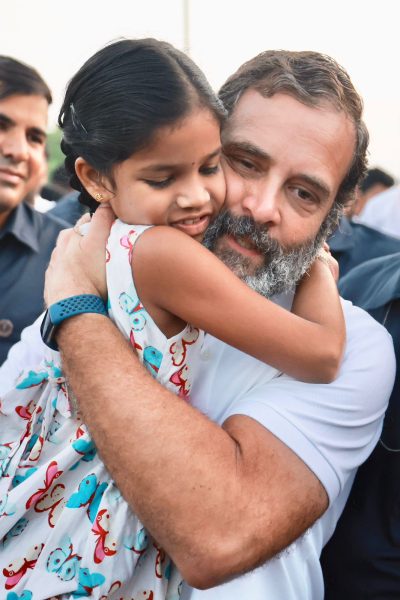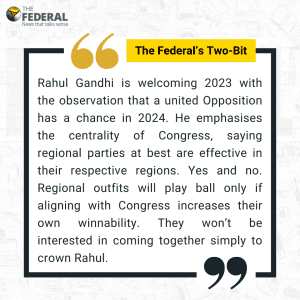
Why Rahul Gandhi is key to the ‘alternative vision’ needed to displace Modi
By asserting the Congress’s centrality to any anti-BJP formation and through the sheer optics of Bharat Jodo Yatra, Rahul Gandhi has thrown his hat in the ring as Modi’s challenger in the 2024 Lok Sabha elections

Congress leader Rahul Gandhi’s assertion of a “massive undercurrent” against the BJP and his underscoring the need for a united Opposition to present to the electorate an “alternative vision” as a pre-requisite for displacing Narendra Modi from power in the 2024 Lok Sabha polls has expectedly made headlines. Lost in the resultant cacophony of political prophecies were two significant takeaways from Rahul’s exposition — one explicit and the other subtly implied.
 Addressing a press conference at the Congress party headquarters in New Delhi on Saturday (December 31), Rahul made it clear that his party’s centrality to any anti-BJP Opposition bloc cannot be wished away because a “central ideological framework and structure” to take on the current regime can “only be provided by the Congress”.
Addressing a press conference at the Congress party headquarters in New Delhi on Saturday (December 31), Rahul made it clear that his party’s centrality to any anti-BJP Opposition bloc cannot be wished away because a “central ideological framework and structure” to take on the current regime can “only be provided by the Congress”.
Prescription for a pan-India Opposition conglomerate
Though Rahul’s comments came in response to questions over Samajwadi Party chief Akhilesh Yadav, RLD president Jayant Chaudhary and BSP supremo Mayawati not joining the Bharat Jodo Yatra, the implication was much wider. “This is no longer a tactical political fight wherein one group can come together to defeat the BJP… what we need is an ideological framework and while I respect the Opposition and its leaders I have to say that a Samajwadi Party cannot give a national ideology… the SP has a positioning in UP, but its ideas cannot work in Kerala, Karnataka or Bihar… only the Congress can give a central ideological framework and it is also our role to ensure that other Opposition parties feel comfortable with this; there has to be mutual respect”.
Also read: It will be difficult for BJP to win 2024 election, says Rahul Gandhi
Rahul’s prescription for a pan-India Opposition conglomerate against the BJP isn’t without context. The Congress’s inability to defeat the BJP in bipolar electoral contests has allowed other Opposition parties — particularly Arvind Kejriwal’s Aam Aadmi Party (AAP), Mamata Banerjee’s Trinamool Congress and K. Chandrasekhar Rao’s Bharat Rashtra Samithi — to ambitiously vie for the pole position within the anti-BJP bloc. Additionally, Kejriwal and Banerjee have repeatedly and vociferously rejected the Congress’s centrality within the Opposition.
These individual bids by AAP, TMC and BRS have largely remained dead on arrival due to various reasons. Important Opposition satraps such as NCP’s Sharad Pawar, DMK’s MK Stalin, RJD’s Lalu Prasad and Tejashwi Yadav, JD-U’s Nitish Kumar, JMM’s Hemant Soren, Shiv Sena-UBT faction’s Uddhav Thackeray, National Conference’s Farooq and Omar Abdullah and PDP’s Mehbooba Mufti have variously said that any bid for a united Opposition sans the Congress would be futile but none — with the exception of Stalin — have endorsed the Grand Old Party as the fulcrum of such a federal political formation against the BJP-led NDA coalition.
Rahul’s claim of the Congress being the “only party” that can give an alternative national ideological framework is, thus, a renewed bid to position his party at the core of any future anti-BJP alliance of disparate Opposition outfits, no matter how unwieldy or fanciful the thought may seem at the moment. The former Congress president’s assertion about the SP — or any other regional Opposition outfit for that matter — being unqualified to present an ideological counter to the BJP nationally is unlikely to be appreciated by Akhilesh or the chiefs of other Opposition outfits, but it is a reality that such regional satraps will have to stomach, no matter how grudgingly.
Mutual respect and ideological concord
On his part, Rahul did try to soften the blow by stressing that he had “immense respect” and a fondness for leaders of all Opposition parties, including Akhilesh and Mayawati. Rahul also made it a point to mention that his party had an “ideological rishta” (relationship) with Akhilesh and Mayawati because both leaders “want an India of love, not hatred”. This reconciliatory statement is, perhaps, Rahul’s bid to avoid the backlash that the Congress drew from Opposition parties the last time he claimed that regional outfits had a myopic political vision limited to the states where they were powerful.
The former Congress chief’s assertion of the need for “mutual respect” between his party and other Opposition outfits is also important. Sundry regional outfits have often been accused the Congress of adopting a Big Brother attitude during seat-sharing talks despite its evident inability to win the seats allotted to it in any alliance. The Congress, on the other hand, has complained that its present and potential allies have eaten into its traditional base and grown at the cost of the Grand Old Party.
Also read: What next after Bharat Jodo Yatra? Cong draws up future strategies
As such, while canvassing for the Congress’s centrality to any anti-BJP alliance at the national level, Rahul has laid out clear grounds for such an engagement; making it incumbent on mutual respect and ideological concord.
A more interesting import, however, may be drawn from what Rahul did not spell out explicitly. Asked if he was positioning himself as the alternative to Modi in 2024, Rahul said he did not want to “fall for these types of questions”. This response has been consistent with Rahul’s position over the years — remember his headline-grabbing “power is poison” comment back in 2013.
An alternative vision
Yet, this response and other statements Rahul made during the interaction have to be read with his stress on the need to firm up an ideological counter to the BJP.
“If the Opposition stands effectively with a vision… what I am hearing from the ground and what I am seeing from the ground, it will become very difficult for the BJP to win. But the Opposition has to coordinate properly and go to the people with a vision, an alternative vision to the BJP… not just go to the people. There is a huge undercurrent against the BJP, massive undercurrent,” Rahul said. He then added, “my focus is on the idea that India should be united, that we fight hatred and anger with affection… we are providing an alternative vision for this country.”
Rahul then went on to explain this “alternative vision” based on his “conversation with the people” through the course of his cross-country Bharat Jodo Yatra that had begun from Kanyakumari on September 7 and is now set to resume from Delhi, following a nine-day break, on January 3 to cover the remaining 450-odd kilometres of its itinerary till Srinagar. Rahul spoke at length on the need for turning India into a “production nation”, the need for “giving our children an imagination and on changing the “mindset from one of GDP growth to GDP growth+employment+exports, etc.” He spoke about measures for ensuring economic equality, emphasised on the need for communal harmony and putting in place mechanisms to ensure institutional autonomy.
Each of these prescriptions, Rahul said, were based on his conversations with common people as well as subject experts he has met and interacted with during the past four months of his BJY walkathon. In short, while insisting that the Congress was best suited to give an alternative ideological vision to the nation, Rahul was saying this vision would be based on what he has learnt through the course of his yatra.
Given that, among the panoply of Opposition leaders, Rahul is the only one to have had the courage of conviction to embark on a 3,570-km cross-country foot march to “unite India” and have a “conversation with the people”. This ‘tapasya’ (penance), as Rahul has often called the BJY, has allowed him to break free from the charge of an inconsistent, non-serious and flippant politician that he was ruthlessly accused of not just by members of the BJP, but also of his own party as well as other Opposition outfits.
Leading the oppposition’s charge in 2024
Akhilesh, Jayant, Mayawati, Mamata Banerjee, Chandrasekhar Rao, Kejriwal and some other key Opposition chieftains have kept away from the BJY. Explaining why they stayed away from an initiative that has caught the public’s imagination and stirred some conversation, no matter the scale, on the grave excesses and lapses of the Modi regime is a burden that these leaders, and not Rahul, have to individually bear. Additionally, Rahul’s frequent public meetings during the course of the yatra and his interactions with the media have also helped buttress his image as the only leader consistently taking on the mighty Modi and his BJP.
Former MP chief minister Kamal Nath has already claimed that Rahul would lead the Opposition’s charge against Modi in the 2024 Lok Sabha polls. Irrespective of whether Opposition leaders echo this sentiment, Congress leaders are likely to repeat Nath’s claim with increasing ferocity in the days to come. Rahul may dismiss questions on the probability of him being pitted as the alternative to Modi in 2024 but by asserting the Congress’s centrality to any anti-BJP formation and through the sheer optics of his yatra, he has thrown his hat in the ring as Modi’s challenger in the 2024 electoral contest.

